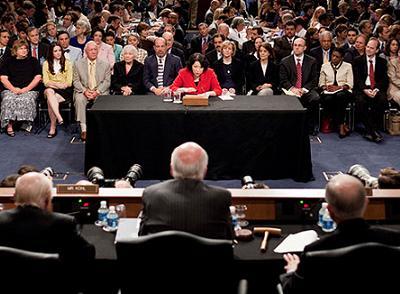
I sure wish I could listen to my college Postmodern Lit professor talk about these Sotomayor hearings.
Please excuse this diversion into shoddy undergrad English-major analysis, but has anyone else noticed the weird refusal to acknowledge that a justice's gender or ethnicity could play a role on the Supreme Court, unless that justice is not male or not white? The kerfuffle over Sotomayor's "wise Latina" comment has gone further than subtly racist partisan pouncing on whatever makes her nomination questionable, and has moved into a strange realm where we all pretend that subjectivity doesn't exist.
When you're a judge, your job is to interpret the law with impartiality and not let your personal viewpoints color your judgment. The law is the law and we as individuals are supposed to fade into an undifferentiated mass of equality and non-discriminatory humanoids before it.
But come on. Even if we all agree that the law should strive for perfect objectivity based on a higher, absolute justice, we all know that's not ever going to be possible. Don't members of Congress know any basic postmodern critical theory?
I'm only half kidding, here. The pomo critics taught us that all the basic tenets that our society is built on--science, religion, the nuclear family, political parties, gender roles, law--are all human constructions that we made up. They don't possess any kind of innate righteousness. The only reason we have the law is that we made it up, if by "we" you mean "white men".
(The postmodernists also say that just like there's no real objective truth, there's also no subjective truth either because the idea of "selfhood" is just another construction, but then you're getting into sophomore-level cultural studies, and I didn't take that class. Here's a pretty good summary of all this stuff.)
I don't expect that we would find much Derrida on Jeff Session's nightstand, but it would be so great if someone in these hearings spoke up and pointed out that if Sotomayor has personal beliefs based on her life experiences that could have some kind of influence on her work as an interpreter of the law, then John Roberts and Clarence Thomas and Scalia and Ginsberg all do too. As justices their job is to strive to see beyond their personal beliefs, though they are still there. Sotomayor spoke about her life experiences as being positive contributions to her legal career, but every judge's experiences somehow influence the way they do their work. How could they not?
We only seem to notice or be suspicious of this when a person other than a white man talks about it, because we have a legal system that was created by white men, and has therefore historically directed more benefits to them than to anyone else. During his congressional hearing, Justice Roberts didn't have to talk about how a wise white guy might add value to a court of law because our courts are already pretty much of, by, and for white guys. Those biases are already there.
At least Sotomayor has admitted this, though now she seems to be backpedaling, playing the objectivity game with Congress. Still, I love that she said this: "Life experiences have to influence you. We’re not robots who listen to evidence and don't have feelings. We have to recognize those feelings, and put them aside. That’s what my speech was saying."
Today, John Cornyn went back to the wise Latina thing again, "asking whether she would regret if her audience of students understood her to be saying that the quality of a judge depended on race, gender or ethnicity." "I would regret that," she said.
I would love to hear John Roberts laboriously explain over and over again how he has explored his own feelings and biases as a white man, then put them aside for the fair application of the law.
